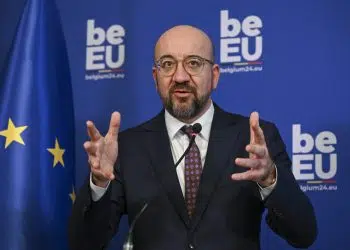Brussels – New year, old problems: the flow of money from Brussels is starting to fill Hungary’s public coffers. After the decisions of the European Commission between the end of November and mid-December 2023, Budapest is now receiving the first installments of payments of EU funds that until now had been frozen due to issues related to the lack of respect for the rule of law. At the end of the first week of the new year, Hungary already received more than EUR 1 billion in payments.
First of all, Budapest received 779.5 million (out of 900 planned) as pre-financing for the EUR 4.6 billion RePowerEu chapter of the National Recovery and Resilience Plan, approved by the EU executive on 23 November 2023. The payment is from last week, but the Commission’s announcement came only yesterday (Jan. 4): “It will accelerate the realization of the RePowerEu plan’s objectives of energy savings, clean energy production and diversification of energy supplies, in order to make Europe independent from Russian fossil fuels in the light of the Russian invasion of Ukraine’. Unlike the general NRRP, the disbursement of the RePowerEu chapter’s pre-financing is automatic and not tied to compliance with the ‘super-objectives’ on the rule of law. The second tranche of EUR 120.5 million ‘is to be disbursed within 12 months of the disbursement of the first tranche’, the Commission services announced. However, what has raised – and is continuing to raise – controversy in Brussels is the unfreezing of more than EUR 10.2 billion of cohesion, fisheries, and home affairs policy funds, as the EU Commission decided on 13 December. It was Finance Minister Mihály Varga who announced that Hungary received the first payment of EUR 445 million, specifying that it will be earmarked for developments in the Operational Programme Plus for Integrated Transport (EUR 240 million) and the Economic Development and Innovation Programme (EUR 205 million). While Budapest awaits the remaining unfrozen billions, the reaction of the largest political force supporting the cabinet led by Ursula von der Leyen, the European People’s Party (of which the Commission president herself is a member), is harsh. In a letter addressed to the number one of the European Parliament, Roberta Metsola, the president of the EPP, Manfred Weber, asked the legal services of the European Parliament to “conduct an in-depth analysis of the situation and to propose a concrete course of action for the Parliament” regarding the decision of the EU executive, as reported by Politico.”We remain unconvinced of the Commission’s reasoning and call on you to request an assessment of this decision.”
The jungle of frozen and unfrozen EU funds for Hungary
According to the most accurate data provided by the Commission services last May, the EU funds for Hungary frozen by Brussels stood at EUR 28.6 billion, divided into three macro-areas: National Recovery and Resilience Plan (5.8 billion), Cohesion Policy funds (22.6 billion) and Home Affairs funds (223 million). The three paths proceed in parallel, each with a specific procedure (or several, depending on the nature of the funding). The first one considers the ’27 super-objectives’ on the rule of law that the Commission established on November 30, 2023, to release Hungary’s NRRP funds or 5.8 billion in grants. Budapest is expected to strengthen judicial independence so that judges’ decisions will be ‘protected from external political interference’.
The second chapter – most definitevely the most complex – is the cohesion policy fund, worth EUR 22.6 billion in funding for Hungary from the EU budget. Of these funds, the Council froze EUR 6.3 billion through the conditionality mechanism on the rule of law in December 2022 (and these remain frozen). This is a separate procedure that concerns 55 percent of the funds earmarked for Hungary by three operational programs financed by the European Regional Development Fund (ERDF), the Cohesion Fund, the Just Transition Fund (JTF), and the European Social Fund Plus (ESF+): ‘Environment and Energy Efficiency Plus’, ‘Integrated Transport Plus’, and ‘Spatial and Settlement Development Plus’. Of the remaining 16.3 billion, 12.9 billion were conditional only on implementing the judicial reforms (without additional criteria), and Brussels partly unblocked these after the review request. The remaining 3.4 billion are frozen due to non-compliance with horizontal enabling conditions – or the required conditions for the EU Charter of Fundamental Rights – in three disputes between the Commission and Hungary: the law on child protection law (the anti-Lgbtq+ law), academic independence, and on the treatment reserved for asylum seekers. The first issue has stalled 3 percent of the cohesion policy budget (i.e., 678 million), the second 9 percent (over 2 billion), and the third an additional 3 percent (another 678 million). It is not enough to end the issues related to the independence of the judiciary (although it remains a pre-requisite) to unlock these funds, as other issues regarding the other horizontal enabling conditions are still outstanding.
Finally, the last issue to consider is the 223.1 million euros from three Home Affairs Funds programs. As Eunews learned in February from sources inside the EU executive – and then confirmed again in mid-November – it is 69.8 million from the Asylum, Migration and Integration Fund (AMIF), 102.8 from the Border Management and Visa Instrument (BMVI) and 50.5 from the Internal Security Fund (ISF). Although the Commission’s lack of transparency makes it complex to figure out exactly which funds have been unfrozen, sources close to the dossier report that it is both ISF and BMVI funds (tied exclusively to judicial matters according to implementation decisions), as well as AMIF funds linked to access to asylum (integration) while those linked to non-refoulement (returns) would remain blocked.
English version by the Translation Service of Withub



![Il presidente della Repubblica, Sergio Mattarella, con la presidente della Commissione europea, Ursula von der Leyen [Bruxelles, 21 maggio 2025. Foto: Emanuele Bonini per Eunews]](https://www.eunews.it/wp-content/uploads/2025/05/mattarella-vdl-120x86.png)


![Il presidente della Repubblica, Sergio Mattarella (sinistra), con il presidente del Consiglio Europeo, Antonio Costa [Bruxelles, 20 maggio 2025. Foto: Quirinale]](https://www.eunews.it/wp-content/uploads/2025/05/mattarella-costa-120x86.jpeg)